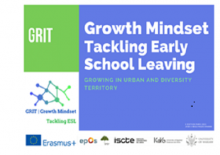GRIT- Growth mindset for tackling Early School Leaving (ESL)
Bénédicte Halba (ed) et Joana Alexandre, Agnieszka Borek, Inês Ferreira, Lien Fret, Kendra Geeraerts, Sveta Solntseva , Magdalena Swat-Pawlicka, Bartłomiej Walczak
The GRIT project aims to fight against Early School Leaving (ESL) by supporting the professional development of educators. The target audience includes educators - individually or collectively. Through a Growth mindset, educators are able to better grasp the potential of their students at school. This pedagogical approach is considered as a major advance in the success of students in school; especially for groups “at risk” of dropping out of school - because of their origins, their mother tongue (foreign), or a more fragile socioeconomic status
To effectively apply this pedagogical approach, it takes an intensive professional preparation of educators to develop a growth mindset and to be able to assess the potential of students and gradually encourage this state of mind to convince them that they have the ability to succeed. The GRIT project promotes the professional development of educators individually or collectively to train them in this mental management approach; tools are needed to help educators who wish to apply such an approach.
The genuine priority is the prevention of dropping out of school. The main goal is to involve educators and schools located in multicultural and multilingual urban areas (sensitive urban areas in France). The project also aims to support educators who work in these neighborhoods where they must be highly qualified to face complex educational challenges. Professional training is therefore essential. The project has designed five intellectual productions: a toolbox for educators; a guide to explain how to use these tools wisely; training for educators; a guide to explain the training to educators; and a digital manual that synthesizes the results of the project






























































